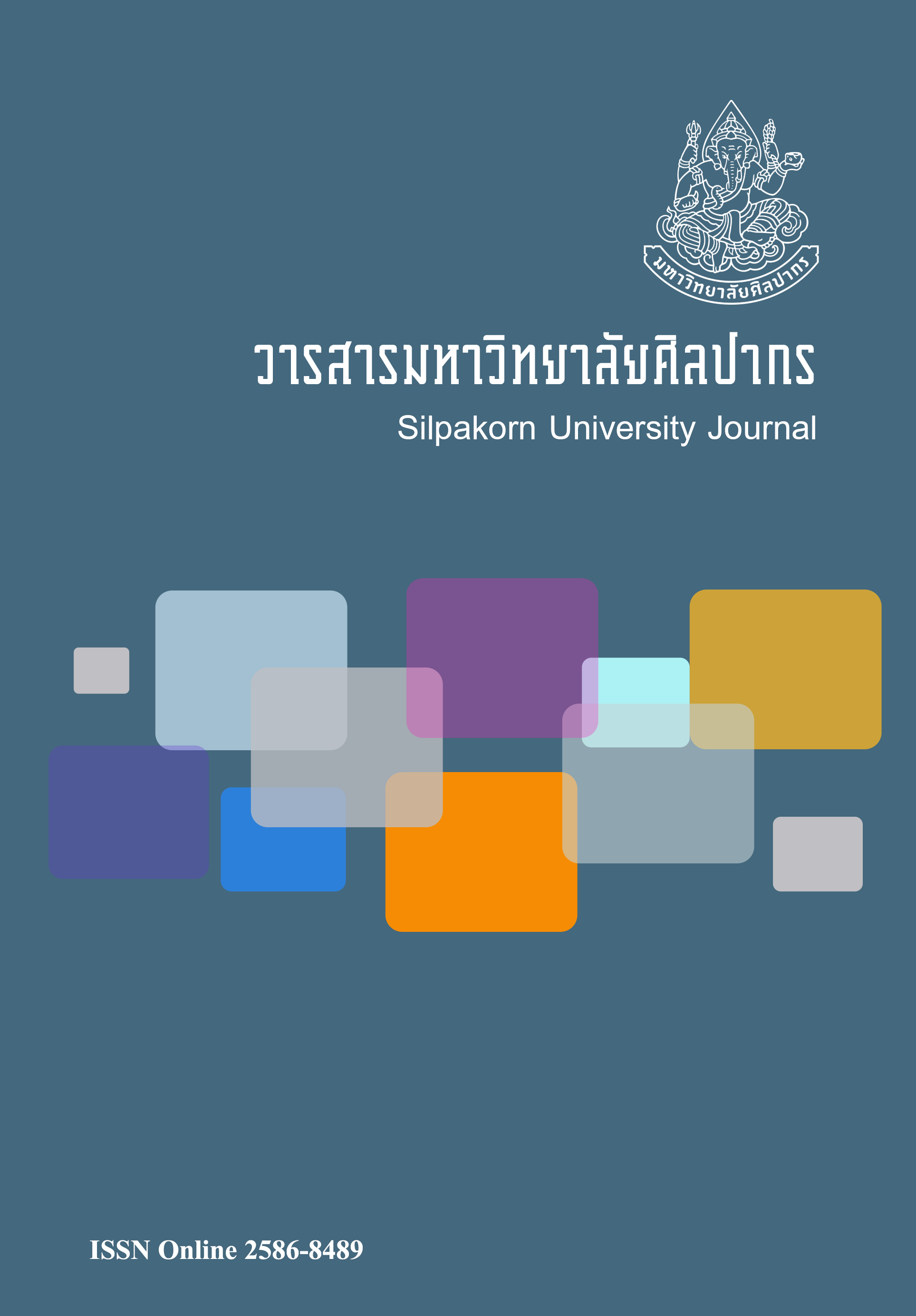กระบวนการเลิกติดเกมคอมพิวเตอร์ออนไลน์ได้สำเร็จ ของเยาวชนไทย (Successful cessation process of online computer game addiction among Thai youth)
Main Article Content
Abstract
วัตถุประสงค์ของการศึกษาในครั้งนี้ คือ เพื่อศึกษากระบวนการเลิกติดเกมคอมพิวเตอร์ออนไลน์ได้สำเร็จของเยาวชนไทย ผู้ให้ข้อมูลหลัก ได้แก่ บุคคลสัญชาติไทยที่มีอายุตั้งแต่ 20 ปีบริบูรณ์ขึ้นไป ซึ่งเคยมีประสบการณ์ในการติดและเลิกติดเกมคอมพิวเตอร์ออนไลน์ได้สำเร็จเมื่อขณะเป็นเยาวชน คือ อายุ 15-24 ปีบริบูรณ์ ระยะเวลาในการเก็บรวบรวมข้อมูลคือ มีนาคม 2555-กรกฎาคม 2556 ใช้การสัมภาษณ์เชิงลึกกับผู้ให้ข้อมูลหลักไปเรื่อยๆ จนกว่าข้อมูลนิ่งหรือข้อมูลอิ่มตัว โดยอาศัยแนวคำถามการสัมภาษณ์เป็นเครื่องมือวิจัย ซึ่งมีจำนวนทั้งสิ้น 15 ราย และใช้การวิเคราะห์เชิงเนื้อหาในการวิเคราะห์ข้อมูล ทั้งนี้ ผลการศึกษา พบว่า ในกระบวนการเลิกติดเกมคอมพิวเตอร์ออนไลน์ได้สำเร็จนั้น เยาวชนมีวิธีการจัดการ ใน 2 ส่วนสำคัญคือ 1) วิธีการจัดการกับอาการติดเกม ได้แก่ การหักดิบ การลดจำนวนชั่วโมงการเล่น การกำหนดวันสุดท้ายของการเล่น และการมีกิจกรรมใหม่เพื่อหลีกเลี่ยงการเล่นเกม และ 2) วิธีการจัดการกับการกลับไปติดเกมซ้ำ ได้แก่ การคิดถึงผลด้านบวกของการเลิกติดเกมได้สำเร็จ ความพยายามในการข่มความอยากภายในตน และการมีทักษะในการปฏิเสธ ทั้งนี้ ปัจจัยที่เป็นอุปสรรคต่อการเลิกติดเกมได้สำเร็จ ได้แก่ เพื่อนในสังคมเกมออนไลน์ คะแนน/ทรัพย์สมบัติจำนวนมากในเกม เพื่อนในสังคมร้านเกม และความสนุก/ความน่าสนใจของเกม และปัจจัยที่เอื้อต่อการเลิกติดเกมได้สำเร็จ ได้แก่ ความสามารถบังคับใจตัวเอง การได้รับแรงสนับสนุนจากครอบครัว และการอยู่ในสิ่งแวดล้อมที่ไม่เอื้อต่อการเล่นเกม
The objectives of this study is to investigate Thai youths’ successful online computer game addiction cessation. Key informants were persons aged 20 or older who have experiences in online computer gaming addiction while they were 15 to 24 years old and have recently successful cessation. Data collection was from early in March, 2012 until late in July, 2013. In-depth interviewing was conducted to the informants over time until findings reached a saturation point, resulting the total of 15 cases. Data were analyzed, using content analysis. The results showed that successful cessation methods can be divided into two parts. 1) The methods for dealing with addiction were sudden termination, reducing hours for playing, setting the last date for playing, and substituting game playing with new activities. 2) The methods for dealing with relapse were thinking about positive outcomes of successful cessation of game addiction, controlling one’s desires, and assertive skills. In terms of impediments, the crucial factors were friends in online game society, high scores or treasures in the game, friends in computer game shop, and game appeal. Facilitating factors in successful cessation were ability of self-control, family support, and living in an environment that hinders gaming.
Downloads
Article Details
References
Freeman C. B. (2008). Internet Gaming Addiction. The Journal for Nurse Practitioners, 4(1), 42-47.
Ganjanapan, A. (2009). Think like Michelle Fuchs; think critically from the discourse of the individual to the turning point of the ego (คิดอย่างมิเชล ฟูโกต์ คิดอย่างวิพากษ์ จากวาทกรรมของอัตบุคคลถึงจุดเปลี่ยนของอัตตา). Chiang Mai: Chiang Mai University Press.Grüsser S.M. and M.D.
Griffith. (2007). Excessive Computer Game Playing:Evidence for Addiction and Aggression?. CyberPsychology & Behavior, 10(2): 290-292. [Online]. Retrieved July 12, 2010 from http://www.ncbi.nlm.nih.gov/pubmed/17474848
Hongsanguansri, S., and Ketumarn, P. (2006). Game addiction: The Crisis and Solution. In Ruangkanchanasetr, S. and Mahachoklertwattana, P. (Eds.).Emerging and Challenging Problems in Adolescents. (p.125-138). Bangkok: Beyond Enterprise.
Joyrod, P., Kasemnet, L., and Jinnge, P. (2010). Factors Affecting Critical Internet-Consumption Behavior of Senior High School Students in Bangkok (ปัจจัยที่มีผลต่อพฤติกรรมการรับสื่ออินเทอร์เน็ตอย่างมีวิจารณญาณของนักเรียนช่วงชั้นที่ 4 ในเขตกรุงเทพมหานคร). Journal of Behavioral Science, 16(1), 72-81.
Kutner, L., Olson, C., and Johnson, S. (2008). The Role of Violence Video Game Content in Adolescent Development. Journal of Adolescent Research, 23(1), 55-75.
LaRose, R., Lin, C. A., and Eastin, M. S. (2003). Unregulated Internet Usage: Addiction, Habit, or Deficient Self-Regulation?. Media Psychology, 3(5), 225-253.
Pornnoppadol, C. (n.d.). Game-Addicted Children (เด็กติดเกม). Department of Psychiatry, Faculty of Medicine, Siriraj Hospital. [Online]. RetrievedNovember 19, 2013 from http://www.thaihealth.or.th/node/14885
Ryu, J. A.and Kim, K.W. (2003). A Study on Personal and Environment Variables Affecting Internet Addiction of Korean Adolescent. [Online].Retrieved January 25, 2009 from www.ciesas.edu.mx/proyectos/mifs2005/.../jin_a_ryu_and_kwang_woong_kim.pdf
Saipanich, R., Silpakit, C., Prasertchai, R., Jumpotjamikorn, A., and Buranapichet,U. (2004). Alcohol : IV. Alcohol Addicts Therapy: Experience in Group Therapy (แอลกอฮอล์ : IV. การบำบัดผู้ติดแอลกอฮอล์: ประสบการณ์จากการทำกลุ่มบำบัด). [Online]. Retrieved July 12, 2010 from http://www.doctor.or.th/node/8000
Sornphaisarn, B. (March 2005). Basic Techniques of Caring Game-AddictedChildren for Parents (เทคนิคการดูแลเด็กติดเกมเบื้องต้นสำหรับผู้ปกครอง).North East Mental Health Association, 7(28), P. 2-3.[Online]. RetrievedSeptember 29, 2010 from http://www.jvkk.go.th/nema/issue28.doc
Supaket, P., Nanthamongkolchai, S., and Damrongsak, M. (2012). Factors Relatedto Computer Game Addiction among Elementary School Students (ปัจจัยที่มีความสัมพันธ์ต่อการติดเกมคอมพิวเตอร์ในนักเรียนระดับชั้นประถมศึกษา).Journal of Public Health, 42(1), 66-77.
Thongkambanjong, W., Chcochom, O., Intasuwan, P., and Supparerkchaisakul, N. (2011). Causal Relation Structural Model among Antecedents AffectingHigh School Students’ Internet Dependency Behavior (ปัจจัยเชิงเหตุและผลของพฤติกรรมติดอินเทอร์เน็ตของนักเรียนมัธยมศึกษาในเขต กรุงเทพมหานคร). Journal of Behavioral Science, 17(2), 104-120.
Thumthong, B. (2012). Influence and Effect of Computer Game Addiction on Students in the Schools under Basic Education Level in the Northeast (อิทธิพลและผลกระทบการติดเกมของนักเรียนตามสถานศึกษาในระดับการศึกษาขั้นพื้นฐานภาคตะวันออกเฉียงเหนือ). Journal of Behavioral Science, 18(1), 47-54.
Tumpoo, N. (10 April 2010). 1st April, D-Day, Seriously Stick to Game-Addicted Children (ดีเดย์ 1 เม.ย. เอาจริงเด็กติดเกม). [Online]. Retrieved September29, 2010 from http://www.thaihealth.or.th/ node/14885
Velicer, W. F, Prochaska, J. O., Fava, J. L., Norman, G.J., and Redding, C. A.. (1998). Smoking Cessation and Stress Management : Applications of the Transtheoretical Model of Behavior Change. Homeostasis, 38: 216-233. [Online]. Retrieved July 12, 2010 from http://www.uri.edu/ research/cprc/TTM/detailedoverview.htm
Winadda, P. (n.d.). Preventing and Helping Children Getting Addicted to Games (การป้องกันและช่วยเหลือเด็กติดเกม). Media and Health. [Online].Retrieved September 29, 2010 from http://www.hiso.or.th/hiso/health_news/health_story4_6.php


